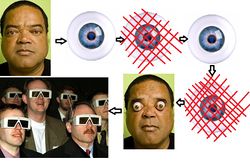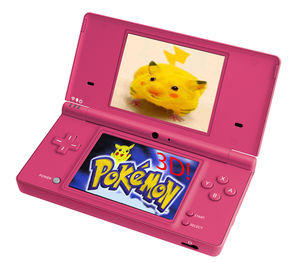SuperUltraReal3D
“Yes we can!”
– Barack Obama on SuperUltraReal3D
“私は金持ちになるよ!!”
– Osama Binoda on SuperUltraReal3D
“This is so me!”
– Oscar Wilde on SuperUltraReal3D
“In Soviet Russia, small dicks elongate YOU!”
– Russian Reversal on SuperUltraReal3D
SuperUltraReal3D (Jap.すぺらるとらりR3づ - Superarutorarir3du) (also called SUR3D or SUR) is an experimental 3D technology developed by a Japanese-Iraqi scientist named Osama Binoda (Japanese: 美野田尾様).
SuperUltraReal3D has 50 times as much resolution as Blu Ray Discs, as well as Full 3D capabilities. Unfortunately, as the human eye cannot perceive the 3D space by itself, a surgical operation called 3DSectomy has to be performed on the eyes. After that, the viewer can enjoy the very high image definition and 3D space.
History[edit | edit source]
The idea first came to Binoda in 1947. After going on a holiday, Binoda met a Japanese kid, whose eyes had been affected by nuclear radiations. That kid, according to Binoda, could "View shingusu zat no one kan(View things that no one can)". After the kid's mysterious death in 1948, his body was used for experimentation. In 1985, 75% of Japan's televisions were SUR. In 2007, the first trial for SUR3D in America took place, and the first SUR3D TV network in America was FoxSUR3D, which first went on air in February 2010. A week later, the first SUR3D TV in America, the 3D3, was released by LG Philips, who borrowed the technology from the Japanese for research on 3DTV, which they made SUR3D TV affordable to the rich upper-class twits of the USA. When it first came out, the price was US$25,000 as the technology was far advanced for the Americans.
SUR3D is planned to be released in Europe in 2015, in China and Korea by 2016, in Australia by 2020 and in India, Southeast Asia and South America by 2022 and in Africa by 2060 [1]
In a BBCの interview, when asked why he invented this technology, Binoda replied:
“Sisu techinoroji wiru janju su wi wu ribu. Itu wiru jibu su Amerikansu a jansu to si riru 3D, andu usu Japaniisu enu moni po- a penisu enra-jementu ouperasiion(This technology will change the way we live. It will give the Americans a chance to see real 3D, and us Japanese enough money for a penis enlargement operation)”
– Osama Binoda on this technology
3DSectomy[edit | edit source]
3DSectomy consists in using a laser to separate the eye into many distinct blocks, emulating flies' eyes. This multitude of eyes gives the viewer full 3D perception. Then, the pieces are patched up together again, cut into smaller pieces, and finally patched up together again. In the end, the viewer has to wear some special 3D glasses. The operation is inexpensive, quick and painless and every new SUR-capable TV will come with a free Do-It-Yourself surgical operation kit. Another method, this time without the requirement to cut the eyes into several pieces, was first introduced by Samsung when they developed SUR3DTV and discovered that the only way to get 3D to become more realistic was to laser out the eyes to get 20/20 vision, then insert special lenses that uses the same technology as contact lenses but works like 3D glasses. The surgical kit only comes with eight contact lenses[2]. Currently, the Korean appliance manufacturer LG are researching on a way to get SUR3 images without the use of lenses or glasses.
SUR TVs[edit | edit source]
SUR TVs are under experimentation[3], and actual production began in 2010 in America and 2015 elsewhere (unless we're already dead by then). The TVs can display such 3D images thanks to their integrated LMDs (Liquid Methane Display; Methane is a gas which can easily be got from cows. Guess how) which, in conjunction with the special glasses, deliver the image to the human eye. Manufactures are working on lowering the costs as much as possible. Sony says that their first SUR TVs will only cost US$58,000[4].
Advantages of SUR TVs[edit | edit source]
- 3D Experience.
- Brand new technology.
- Japanese-grade definition.
- 'Green', used SUR TVs can be directly converted into silicon, ready to be implanted into breasts, legs or...penises.
- New technology!!!
- Cool glasses
- Did I mention it's NEW?
- Elevated Contrast and Color Accuracy
- Better than 3DTV
Disadvantages os SUR TVs[edit | edit source]
- Elevated cost.
- Prolonged use can cause headache...
- ...and impotence...
- ...and eye cancer...
- ...and AIDS...
- ...and Asperger's Syndrome...
- ...and Alzheimer's Syndrome.
- You can't watch it while you are drunk or having a hangover. [5]
3D Porn not available yet.Now Available!
Examples[edit | edit source]
Few examples of SUR images are available, and they still look very unrealistic because of the current equipment. The few available images are displayed below; they're all cartoon characters, as cartoons are the easiest to convert to SUR.
Nintendo, after releasing the Nintendo DS, DS Lite; DSi S, M, L, XL, XXL has announced a new product called the Nintendo 3DS. Leaked images hint that it will most probably include a glasses-less version of SUR3D, using technology from their failed Virtual Boy project from 1995.[6]
References[edit | edit source]
- ↑ O RLY? NO!!!!!!
- ↑ Replacement lenses are also available.
- ↑ Except Japan, in which it is readily available
- ↑ Surgical operation and glasses cost excluded.
- ↑ Samsung warns that drinking can cause headaches while watching SUR3D.
- ↑ Virtual Boy project involves the use of SUR3D technolgy. However, it uses two colours, and therefore looks like blood and crap stains.











